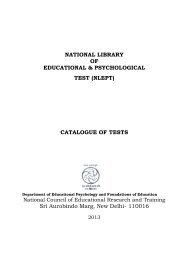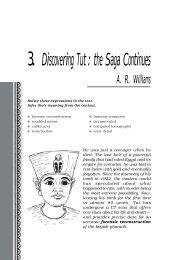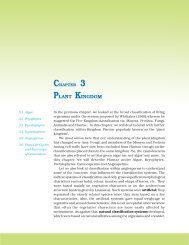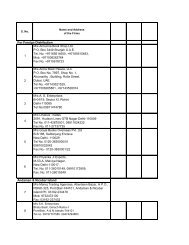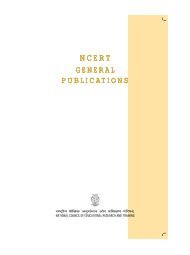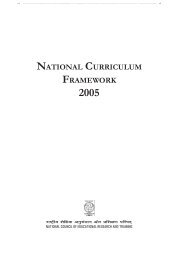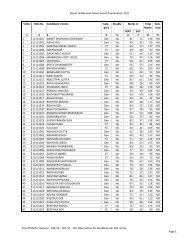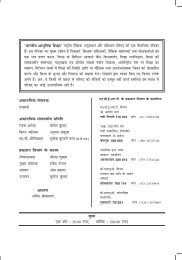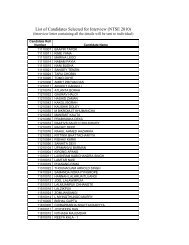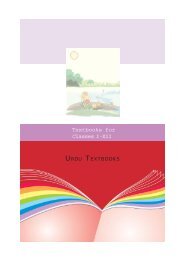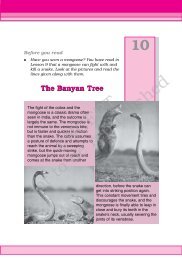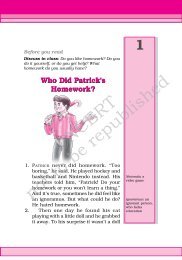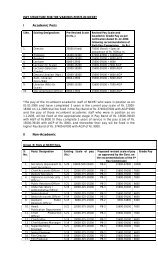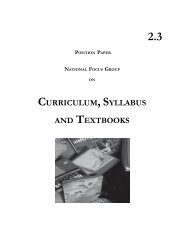Annual Report - National Council Of Educational Research And ...
Annual Report - National Council Of Educational Research And ...
Annual Report - National Council Of Educational Research And ...
Create successful ePaper yourself
Turn your PDF publications into a flip-book with our unique Google optimized e-Paper software.
NCERT<br />
72<br />
Development of Supplementary Materials in Personal Finance<br />
The department has prepared Supplementary Materials in Personal Finance to<br />
provide students with an awareness and understanding of financial concepts so<br />
that they may take informed financial decisions in an emerging area affecting<br />
individual’s financial decisions. This will enable students develop proper<br />
understanding as well as desired attitudes in money matters in a responsible<br />
manner so that they can maintain a balance between income, expenditure, saving<br />
and investment. Supplementary Reading Material on Personal Finance provides<br />
answers on various financial queries that children are sure to encounter in life. It<br />
helps in matters like, How to remain within a budget? How to manage money for<br />
day to day expenses? How to finance large purchases or build up assets? How<br />
to protect assets? Which insurance plan covers all risks? Where to invest money–<br />
in bank deposits or mutual funds or shares of a company? What will happen on<br />
retirement? Where to invest so as to get regular returns? It shows how planning<br />
for taxes helps in reducing tax burden and earning more from investment.<br />
Preparation of Handbook Volume II— Supplementary Reading Material<br />
in Economics for the Higher Secondary Stage<br />
The department undertook the task of developing the handbook for the practising<br />
school teachers. Its objective is to provide enrichment material to PGTs in<br />
Economics, which may facilitate in establishing the linkage between the<br />
methodology of teaching of economics with different themes/topics and usage of<br />
mathematical expression. Topics/themes were selected on the basis of suggestions<br />
received from practising post graduate teachers from different regions of the<br />
country.<br />
This handbook has been developed in two volumes. Volume I includes the<br />
use of various pedagogical approaches for teaching of economics in classes XI<br />
and XII i.e. teaching economics through problem solving methods, concept<br />
mapping, simulation, games, story telling, use of mathematical expression such<br />
as algebra, equation, graphs etc. Volume II is an extension of Volume I which<br />
focuses on establishing a linkage between the identified themes/topics and the<br />
methodology of teaching economics. Views, suggestions and the feedback received<br />
from the teachers and experts have been incorporated while finalising the material.<br />
The Handbook will not only appraise the post graduate teachers of economics<br />
with different methods of teaching economics but also enhance and upgrade<br />
their teaching skills.<br />
Development of a Standardised Format for CCE in Social Sciences from<br />
Classes I-X<br />
As proposed under the Plan of Action for 2010-11, the department undertook<br />
‘Development of a Standardised Format for CCE in Social Sciences from Classes<br />
I-X’. A draft framework was developed within the stipulated timeframe of three<br />
months, i.e. August-October, 2010 based on the specific objectives of teaching<br />
social sciences at different levels of school education as per the guidelines provided<br />
in the NFG ‘Position Paper on Teaching of Social Sciences’, the ‘NCF-2005’ and<br />
the NFG ‘Position Paper on Examination Reforms’. It included rationale,<br />
curricular objectives of teaching social sciences at different levels, procedure to<br />
be followed in implementing CCE in social sciences, strategies for doing and<br />
evaluating projects in social sciences under CCE and the ‘model format’ with<br />
notes for its implementation at the school level. It was shared with members from<br />
<strong>Annual</strong> <strong>Report</strong> 2010-11



